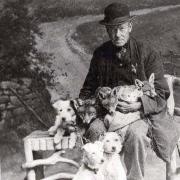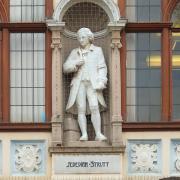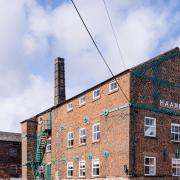David Marley speaks to the county’s most senior police officer and discovers his passion for bringing more offenders to justice

‘AFTER 29 years of public service with the police, there was only one place in the country that I wanted to be chief constable – and that was here,’ declares Peter Goodman, as he steps into the top-ranking role at Derbyshire Constabulary.
Peter successfully navigated a competitive recruitment process earlier in the year, receiving the backing of Hardyal Dhindsa, the county’s Police and Crime Commissioner, and with it a five-year contractual term of office.
Commissioner Dhindsa was quick to praise Peter’s personal and professional qualities for the role, saying: ‘Appointing a chief constable is a huge privilege and carries with it a heavy weight of responsibility. It is one of the biggest decisions I am expected to make as Commissioner but I am confident that I have appointed the right person to lead Derbyshire Constabulary.’
Peter, 51, took formal command of the Force at the beginning of June – and with it the responsibility for keeping the people of Derbyshire safe and secure. He is also in charge of a budget of over £160 million and accountable for the leadership of an organisation which employs over 3,500 people, including 1,700 police officers and detectives.

‘I am genuinely humbled and elated to be asked to serve as Derbyshire’s chief constable – it is the high point of my career,’ he says. ‘It is an absolute privilege and honour to lead such a special police force.’
None of Peter’s family had ever worked for the police before he did – and he acknowledges that he ‘dropped into the job’ after he graduated with a degree in English Language and Literature from the University of Leeds.
‘Looking back I think my parents had aspirations that I would continue my studies. I think there was an intention for me to do a masters degree, leading on to a doctorate,’ he remembers. ‘I imagine they were a little bit disappointed that I did not follow the academic path, and they were more than a bit surprised that I signed up to be a police officer.’
Soon after finishing his university course Peter took a graduate management job with a large insurance company. ‘I just couldn’t settle into the routine of working behind a desk every day, so I only lasted in the job for about seven or eight weeks,’ he laughs.

Getting another job with a pay packet was a priority for Peter, so he turned to a family friend who ran a building company, taking a job as a bricklayer’s labourer. ‘I loved being outside in the fresh air, working with a great team. This was a wonderful time and I look back with many happy memories,’ he recalls.
‘However, after nine months I decided that it was about time I started to find a job where I could use my brain and degree; so I began a search for a career that offered the very best of everything I enjoyed in life.’
There was no particular catalyst for him to select the police, apart from his own criteria of wanting to work outside and to be part of a team. ‘At the time my friends and extended family were literally horrified that I was thinking of joining the police,’ he smiles. ‘But back then I was a bit of a rebel against conventional thinking and I also wanted to do something where I could use my own discretion – so a career with the police seemed to me to be the perfect fit.’
Despite there being no tradition of policing in his family, there was a strong legacy of public service. Peter’s father served as a clergyman in the town of Eastwood, on the border of Derbyshire and Nottinghamshire, and his mother worked as a nurse.
‘My father was the rector of Eastwood and he also taught part-time at the local high school in Aldercar,’ he explains. ‘My sister was a teacher and my grandfather had been a park-keeper in Leicestershire, so public service and a commitment to doing good for the community is very much part of my family’s heritage.’
In April 1988 – a period of history marked by social unrest, political protest and economic change – Peter took his first steps into the world of policing as a new recruit with the Nottinghamshire Constabulary.
‘Policing at this time was very different. As a young beat officer my work was much more structured – a world away from the responsibilities of today’s modern police constable,’ he remembers. ‘Policing is now so much more complicated – and people’s expectations and needs are totally different in what they want and demand.’
By the early 1990s Peter had been made a detective and he was leading a number of investigations into the most prevalent crimes in the city of Nottingham. ‘I was working as a detective sergeant and the offence of burglary, a very tangible crime, was my team’s main focus,’ he says. ‘In those days a detective would gather some physical evidence, search for witnesses, seize some closed circuit television and then make some arrests – with the aim of securing an admission from the offender.’
Since then, Peter concedes that changes to technology and science have dramatically changed the scope and scale of modern police investigations. ‘Most offences are now occurring in the online world, rather than in the offline world,’ he says. ‘All investigations now tend to involve a digital element.’
‘Inquiries now include some form of downloading of data; whether that be from mobile telephones or computers, or the interrogation of satellite navigation information, or the use of automatic number plate recognition. And this has dramatically changed the role of a police officer and the skills required to do the job. Never in the history of policing have there been so many fantastic tools to help us catch criminals and solve crimes. I believe this pace of change will continue into the future.’
Having spent over half of his policing service in uniform he is well placed to make such assessments. ‘We’ll always need generalist police officers – but there may be fewer of them in the future,’ he argues. ‘Most of today’s officers tend to be graduates and they have some amazing talents. But in the future we will also need to employ many other specialists, including computer programmers, criminologists and psychologists to detect offenders.’
Playing a key role at the core of the criminal justice system as a whole is an increasing priority of Derbyshire Police. ‘It is no longer the case that my officers simply gather evidence before delivering files to the Crown Prosecution Service (CPS) to make decisions on whether a charge can be agreed or not,’ he reflects. ‘We now work much more closely with prosecutors, from the very outset of a crime all the way through the investigations and up to trial – this ensures we are always case-ready for when we go to court.’
Relations with senior prosecutors are good and Peter is looking forward to his first meeting with Janine Smith, the Chief Crown Prosecutor for the East Midlands, in the coming weeks.
Scientific advances, including the increased use of computer technology, continue to impact on the modern day delivery of policing in the community. The days of pocket-notebooks and streams of paper-based forms are disappearing – and they are now increasingly being replaced with digital systems. Since last November the Force has distributed over 1,600 mobile devices to beat officers, to enable them to take statements and upload data directly to central police computer systems.
Policing priorities are also changing, with many new offences and crime types being created every year. Officers are now investigating a much broader range of crimes. They include: robbery, human trafficking and exploitation, organised crime groups, terrorism and domestic extremism, cyber offences and the safeguarding of children.
‘Our focus is altering. When I was on the beat in Nottingham nearly 30 years ago, many of the types of crimes we are now investigating had not even been invented,’ he says. ‘In those days the relationship between the victim, the perpetrator, and the location of the offence was very clear. Today, especially in the cyber world, it is no longer the case. Many offences are now being coordinated by very wealthy people living overseas.’
‘The fact that these criminals live abroad does not mean they are beyond our reach,’ he states. ‘Even those who are beyond our jurisdiction will be investigated and arrested when the time is right.’
Prior to his appointment to the pinnacle command role of the Force he was employed as deputy chief constable of Derbyshire Constabulary in addition to holding the same rank for the East Midlands region with responsibility for the Special Operations Unit, which provides services to the forces of Nottinghamshire, Derbyshire, Lincolnshire, Leicestershire and Northamptonshire in relation to serious and organised crime, major crime, counter terrorism and forensic investigations. In 2013 his effective contribution was noted and he was awarded the Queen’s Police Medal (QPM) for services to policing.
His work with the specialist crime unit puts him in a great position to understand and coordinate these more sophisticated types of offending. ‘We are already working closely with local people and businesses when they have been attacked by cyber crime – and that includes helping them to get back up and running after the event,’ he explains.
‘We are also investigating serious and organised crime, including terrorism, across county borders with our friends in neighbouring forces. This all ensures we are offering a more effective and efficient service, which provides the best value for money for the people of Derbyshire.’
Speaking in the shadow of the recent terrorist atrocities in London and Manchester, Peter is eager to praise the bravery and commitment of the emergency services. ‘While many people wish to run away from these threats, police officers are trained to run towards them – and I am so proud of their actions in saving lives and dealing with the situations,’ he says.
The Force made a deliberate decision not to deploy firearms officers on the streets of the county in the days after the terrorist attacks. ‘In Derbyshire we thought on balance that by doing so it could lead to increased anxiety – and I stand by that conclusion,’ Peter confirms. ‘I don’t advocate the arming of all officers, but in the future there may be more instances of police officers attending incidents with less-lethal weaponry, such as tasers.’
Closer, more integrated working is not just restricted to his police colleagues. In September 2016, Derbyshire Constabulary moved into a new joint police headquarters with the Derbyshire Fire and Rescue Service. The new building, sited at the existing police headquarters at Butterley, near Ripley, houses administrative functions for both organisations.
‘We have a fantastic relationship with the Fire and Rescue Service,’ he says proudly. ‘Both uniformed and non-uniformed fire and police personnel are working side-by-side, allowing for a more efficient and effective front line service delivery.’
In today’s world the use of creative partnership working seems to be a strong element in the arsenal of a chief officer. And in Derbyshire Police this is being done to help detect some of the more hidden crimes that plague vulnerable rural communities.
In the last few months, the Derbyshire Rural Crime Unit has been set up to tackle rural crime across the county and particularly across the Derbyshire Dales. Alongside raising awareness of how people in the farming and rural communities can protect themselves from thieves, they will also be investigating offences.
It would be understandable if after 29 years’ police service Peter might have been thinking of hanging up his police cap – but he has no thoughts of retirement. ‘I could retire next year, but I have absolutely no intention of doing so! I love serving my community and can’t wait to embrace my new role,’ he says. ‘I have been with Derbyshire Police for over ten years now, and I am determined to use my promotion to make the county an even safer place to live.’
As he takes command of the Force, he is very aware of the enviable legacy he inherits from the previous custodian of the office of chief constable. Mick Creedon led the Force for over ten years and was widely regarded as a good chief constable. Public satisfaction in Derbyshire Constabulary is very high, with a recent British Crime Survey reporting a confidence level of 76.2 per cent, which is one of the highest in England and Wales. And in a recent assessment of Derbyshire Constabulary, Zoe Billingham, Her Majesty’s Inspector of Constabulary, judged the Force to be ‘good’ in three out of four graded areas and ‘outstanding’ in tackling serious and organised crime, stating: ‘I am pleased with the performance of Derbyshire Constabulary in keeping people safe and reducing crime.’
‘Mick was something of an iconic figurehead – both locally and nationally – and he will be very much missed,’ Peter acknowledges. ‘He was a strong leader and he loved Derbyshire and its people. I share his values and vision.’
In his quieter moments Peter confesses to enjoy unwinding with an episode or two of BBC One’s Line of Duty.
‘I think the producers of the show have done a reasonably good job in portraying the role of the police,’ he says. ‘I enjoy the anti-corruption element of the drama – and the writing is sufficiently removed from reality not to become an irritation,’ he laughs. ‘It is also well written and has helped to increase the attractiveness of what we do in the eyes of the public.’
Peter believes that one consequence of the drama is more people will be keen to seek employment with the police. ‘We’ve got so much to offer as an employer – and we aim to recruit many more people in the future. We also have some great volunteer roles, such as the special constabulary, which increase opportunities for people to serve close to the community where they live.’
As chief constable Peter is also charged with the welfare of all of his officers and support staff. ‘It is really important to reflect on the demands placed on our people by the challenging diet of work they undertake,’ he says.
‘The complexity of the work we do can lead to stress and over the coming months – as part of the “Valuing Your Views” roadshow – I will be speaking to over 120 groups of staff, listening to what is important to them and how we can make their jobs better for them.’
In his private time, he enjoys spending precious moments with his family near his home on the north-west Leicestershire border with Derbyshire. ‘My children have yet to show an interest in following me into the police,’ he says. His eldest daughter, Harriet, is a nursing assistant in a home in Nottinghamshire. His son James is studying biochemistry at Sheffield University, and his youngest daughter, Evie, is completing her GCSEs at school.
‘Naturally, I would be very proud and supportive of them if they wished to become a police officer – the job offers excellent opportunities,’ he says.
There is one final question that is just itching to be asked: ‘Is his family now pleased that he decided to go into the police service rather than follow the academic path?’
‘Yes, they are – and they are very, very proud too,’ he grins.
With the role of the police service certain to evolve further, Peter looks as if he will be very busy over the next five years. But with his warm, positive and professional approach, we can be very confident that he possesses all the necessary qualities to be an excellent chief constable, uniquely placed to continue to make Derbyshire a safe and secure place in which to live and work.



























